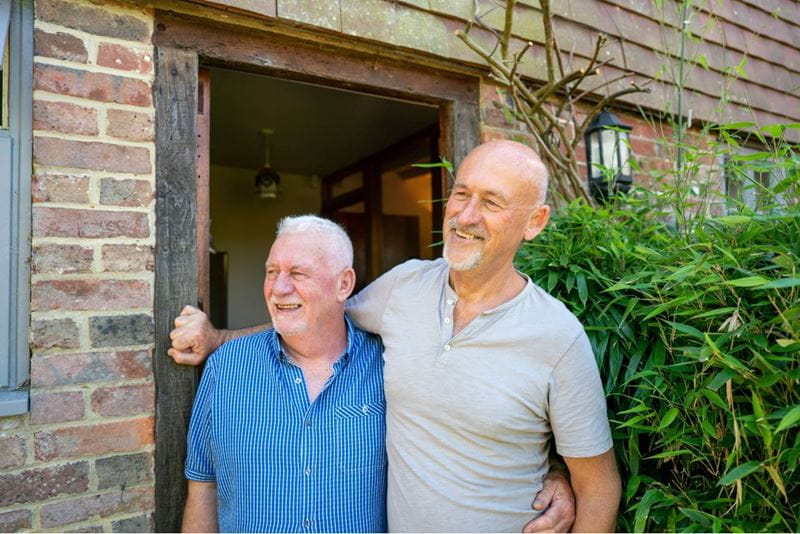
Although a guarantor assumes ultimate responsibility for payments, you won’t own a share of your loved one’s home. It will belong to them. For home buyers who can’t raise a large enough deposit or whose income isn’t enough, becoming their guarantor could be a solution.
Important: As with any mortgage, this is a loan secured against your home. If you can’t keep up with your monthly payments, you or your loved one may lose your home.
Key takeaways:
A guarantor mortgage functions much like a standard mortgage with monthly payments over the course of the term. The main difference is how you secure the loan:
Having a guarantor can help your loved one get a bigger mortgage. That’s because it gives lenders more confidence in their ability to repay the loan.
Even with a small deposit – or no deposit at all – some guarantor mortgages let your loved one borrow up to 100% of the property’s value.
Guarantor mortgages can cost more than standard ones. They often come with higher interest rates, especially if the lender lets you borrow up to 100% of the property’s value. This means monthly repayments may be higher.
The reason for this is that lenders see these mortgages as riskier. The borrower might have a lower income, a small deposit or a poor credit history. That’s why they need a guarantor to act as a financial safety net.
Most lenders only allow one guarantor on a mortgage. This helps them manage risk and keep things simple. Having more than one guarantor can make the process more complex and increase the overall risk.
However, some lenders may allow more than one guarantor. It’s important to check the terms and conditions carefully to see what’s possible.
If the mortgage is secured using savings, you put money into a savings account held by the lender. It works by a guarantor depositing 10% of the property’s total value into a designated savings account. This is then used instead of your loved one supplying a down payment.
The lender holds the savings as security for the mortgage for a set period – usually five years. At the end of the fixed period, you will get your savings back plus any accrued interest, as long as your loved one has made their repayments each month.
Two types of guarantor mortgages that use savings as security are:
1. Family springboard mortgages.
2. Savings as security mortgages.
When the mortgage is secured using your home, it will be used as collateral if your loved one is unable to make payments. The lender will try to find ways to resolve a difficult situation. But as a last measure, you will be asked to repay any debt if the home on the mortgage is repossessed.
Another option is a Deposit Boost, where you unlock money from your home with a small mortgage. The money released can go towards the deposit, giving your loved one more spending power.
A Deposit Boost is not technically a guarantor mortgage because the guarantor is not liable for future repayments. But it’s another way for you to help loved ones buy a home.

Whether you have questions about a specific kind of mortgage or just want to find out more, the expert team are on hand to help.
Mon-Thu 9am-8pm
Fri 9am-5:30pm
Sat-Sun 10am-3pm
An Income Boost could also be used to support your loved one’s mortgage application. Your income is not actually used to fund the purchase. It simply boosts the borrowing power of your loved one.
You will not be named as a co-owner of your loved one’s home. But you may need to contribute financially if your loved one misses monthly repayments in the future.
Wondering what the different types of guarantor mortgages are? Let’s walk you through the options.
With a Family Springboard mortgage, you put 10% of the home purchase price in a dedicated savings account. Your loved one can also deposit up to 9.9% or nothing at all.
After a fixed period, if all mortgage payments have been made, the lender will return your savings plus any interest. You can help more than one loved one buy a home at the same time. And you can grow your savings in the process.
Due to the costs involved and inability to access savings for a length of time, family springboard mortgages don’t suit everyone. But they could be an option worth considering.
Another solution is a Joint Borrower Sole Proprietor mortgage. It’s also known as a JBSP mortgage or Income Boost. It allows you to join your loved one on their mortgage to boost the amount they can borrow.
You agree to be jointly responsible for the payments without being listed on the property deeds. Your loved one becomes the sole owner, and you will avoid any hefty Stamp Duty bills if you move home in the future.
A Deposit Boost allows you to gift money to a loved one to boost their buying power. It works by taking out two mortgages:
If you own a property and want to help a loved one buy their first home, a gifted deposit boost could be worth thinking about. Your loved one could secure a lower interest rate thanks to the bigger deposit. And the balance of your loan doesn't have to be repaid until your loved one sells their property.
Being a guarantor can impact your ability to get a mortgage in the future. Lenders may see it as a financial risk, since you could be responsible for someone else’s loan if they don’t pay. This can lower your affordability – the amount lenders think you can afford for a new mortgage.
You’ll also be financially linked to the person you’re helping. If they miss payments, it could damage your credit score, which may affect your chances of getting approved for a mortgage.
To be a guarantor, you need to show that you’re financially stable and able to take on the responsibility if the borrower can’t repay the loan.
You can be a guarantor even if you have your own mortgage. The lender will check that you can afford both your current payments and any payments you might need to cover if the borrower can’t pay.
Before agreeing, make sure you understand the risks and responsibilities. Being a guarantor is a serious financial commitment.
Retired people can be mortgage guarantors. You need to show that you’re financially stable and meet the lender’s requirements.
Lenders will check your income from pensions or savings and may also look at any property you own. They need to be sure you can cover payments if the borrower can’t. Some lenders set age limits for guarantors – often between 70 and 75. If you’re above this age, you may not be eligible, so it’s important to check the lender’s rules.
Anyone has the potential to be a guarantor on a mortgage, but it's normally a parent, family member or friend. There are some things you should consider first:
Looking to help a loved one buy a home? Saga Mortgages could make it easier. We work with Tembo, an award-winning digital mortgage broker, to help families like yours reach their property goals. You’ll get friendly advice and access to hundreds of mortgage deals – some that could save you money and stretch your budget further.
It’s quick and easy to get started. Just register your details and answer some simple questions. You’ll then see personalised examples of mortgage options, including costs and interest rates. If you’d like, you can also speak to someone for more help.
We'll let you know the amount of tax you'll be liable to pay, whether you’re a first-time buyer, moving home, or buying an additional property.
Your stamp duty will be:
The amount you pay is based on Stamp Duty bands. The tax is calculated on the part of the property price falling in each band.
A mortgage is a loan secured against your home. Your home may be repossessed if you do not keep up with payments on your mortgage. Saga Money may receive payment from Tembo if you get a mortgage offer via the Saga Mortgages service. This will not affect the amount you pay for the service.
Saga is a registered trading name of Saga Personal Finance Limited, which is registered in England and Wales (company number 3023493). Registered office 3 Pancras Square, London, N1C 4AG. Saga Personal Finance Limited is authorised and regulated by the Financial Conduct Authority under the registration number 178922.
Tembo Money Limited (12631312) is a company registered in England and Wales with its registered office at 18 Crucifix Lane, London, SE1 3JW. Tembo is authorised and regulated by the Financial Conduct Authority under the registration number 952652. Tembo Money was awarded Best Mortgage Broker at the British bank awards in 2022, 2023, 2024 and 2025.


Provided by Tembo
Find out all you want to know about mortgages with expert advice.


Saga help explain how you can pay off an interest-only mortgage.

Discover all the essential information about mortgages in principle in our detailed guide.